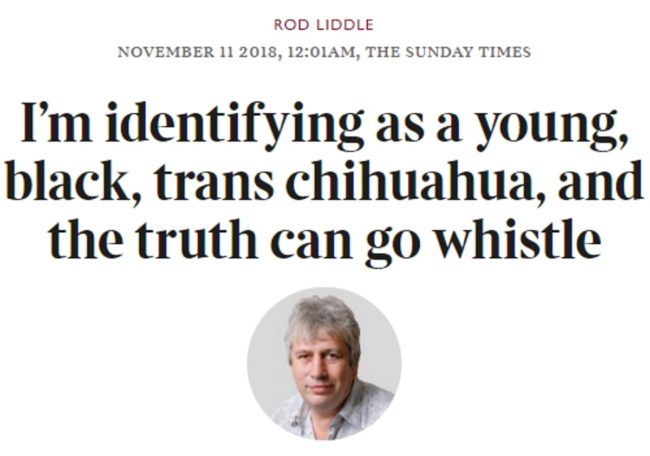A handy guide on how to complain about offensive, inaccurate coverage of trans issues in the UK press

Protesters blow whistles during a transgender rights march in March 2019 (Getty)
Since Joe Biden was sworn in as president of the United States of America on the 20 January, he’s already enacted several crucial bills to help and support transgender people.
This has led, predictably, to large swathes of the UK press publishing things about transgender people that are at best, misguided and misinformed, and at worst hurtful, misleading and offensive.
For example, after Joe Biden signed an executive order that would protect transgender athletes from discrimination in high school and college sports – allowing them to participate as their identified gender – the term #bidenerasedwomen began trending in the UK, a flurry of toxic anti-trans tweets that regurgitated common myths, for example sharing a photo of wrestler Mack Briggs who they claim decided to identify as a woman so he could beat “biological females”.
He’s actually a trans man.
Seeing people post this picture in #BidenErasedWomen as if this isn't literally what they're advocating for…this is a trans guy named Mack Briggs who wanted to wrestle with boys but was forced to wrestle with girls because of sex-specific rules, even on testosterone. pic.twitter.com/V166PWLgQR
— Trans Women are Women ✌️ (@MxAmericanPi) January 21, 2021
People fought hard against the pervasive misinformation, with one trans ally writing: “A reminder that Biden’s executive order on trans rights exists so that trans people can’t be fired or evicted for being trans anywhere in the US, whereas previously there were places this was legal to do. Let’s focus on that shall we instead of made-up nonsense.”
Then the UK right-wing press decided to weigh into the fray and amplify those trans-exclusionary voices. The Daily Mail went with: “So much for unity. Biden sparks outrage after signing divisive executive order pushing schools to include transgender athletes in girls’ sports – causing critics to declare that the new president is ‘erasing women’.”
The Sun splashed: “‘NEW GLASS CEILING’ Biden executive order pushing for transgender inclusion in sports SLAMMED by critics for ‘erasing women’.”
A few people took to Twitter to ask how to complain about discriminatory coverage like this, so we thought we would put together a handy guide. Because frankly, let’s be honest, it’s definitely not going to stop anytime soon, as Biden has pushes forward to enshrine more LGBT+ protections into American law, most notably the Equality Act.

Coverage of transgender issues in the UK press has exploded since 2012, much of it negative (The Spectator)
In 2019, the charity Mermaids commissioned research that found that the British press has increased its coverage of stories about trans people over the last six years writing roughly three and a half times as many articles in 2018-19 compared to 2012.
Who can complain about a UK newspaper article?
Complaints need to be directed to the Independent Press Standards Organisation (IPSO), who investigate breaches of the Editors’ Code of Practice, a set of rules that cover a wide range of breaches, including accuracy, privacy, harassment and discrimination. You can’t just complain because you didn’t like the article, but there are other grounds for complaint.
The accuracy clause is a crucial one. It reads: “The Press must take care not to publish inaccurate, misleading or distorted information or images, including headlines not supported by the text.”
Anyone can complain if an article is inaccurate, for example if it contains significant misinformation about transgender people or their rights. In that case, you’ll make a complaint under Clause 1 (Accuracy) of the Code.
Another option is to complain to IPSO as a representative group. To complain as a representative group you will be asked to explain which group you believe has been affected by the alleged breach of the Editors’ Code, how you are representative of that group, how you believe the alleged breach is significant and how you believe the public interest would be served by considering the complaint. Their Complaints Committee will then decide whether to take forward your complaint.
You can also complain to IPSO if you are direct subject of an article or someone who has been directly affected by the behaviour of a journalist.
How do you complain to IPSO?
IPSO receives complaints via their online form. You can also email or send your complaint by post.
With your complaint, you should:
- send them a copy of or link to the article you are complaining about (if there is one)
- tell them which clauses of the Editors’ Code you think have been broken, and explain why you think they have been broken, and
- send them copies of any letters or emails about your complaint that you have sent to the newspaper or magazine, or they have sent to you.
What will happen if the complaint is upheld?
The consequences of an upheld IPSO complaint can be significant. IPSO can publish an adjudication, which may include a requirement to address the concerns raised, or impose a fine on the member(s) of up to £1 million.
It’s certainly not something any publication takes lightly. You can see past rulings and resolution statements here.

